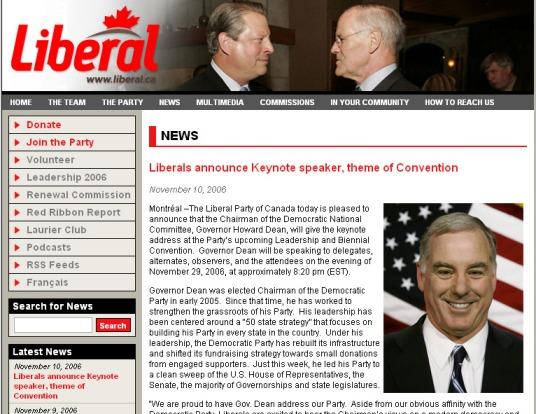Here are the main points of Flaherty’s economic update:
- Eliminate the net debt by 2021
- Reduce debt to 25% of GDP by 2012-13
- inflation target at 2% until at least 2011
- GST at 5% by 2011
- Working Income Tax Benefit for low-middle income Canadians
- Income tax reductions based on interest that would have been paid on the debt. Debt reduction will result directly in income tax cuts.
- Establish lowest tax on business investment in G7.
- Large investments in the knowledge and training economy
Here’s the executive summary of Advantage Canada.
Income splitting, but just for seniors. No GST cut yet.
VERDICT: Nothing too exciting. A good direction forward.
UPDATE: David Akin sends me a correction live from the finance committee! It’s NET debt that’ll be gone by 2021, not the debt.
UPDATE: NDP finance critic Judy Wasylycia-Leis is decrying the Conservative plan to put so many surplus dollars against the debt. A sound endorsement!
UPDATE: Liberal finance critic John MacCallum isn’t impressed and believes that this doesn’t change anything. Underlines the distinction of “net-debt” and calls it a gimmick. Net-debt is a valid OECD measure though.
UPDATE: reaction from stakeholders (the ones that do press releases!)…
The Canadian Real Estate Association
(CREA) and its more than 88,000 REALTOR(R) members across Canada welcomed the
federal government’s identification of tax, fiscal, and infrastructure issues
as key elements to improve the quality of life for all Canadians. The three
were among the five Canadian Advantages outlined in the Fall Economic
Statement delivered by Finance Minister Jim Flaherty today.One of the proposals outlined by Minister Flaherty in the Advantage
Canada document was the reduction of taxes on savings, including capital
gains, to make Canada’s tax system more competitive. REALTORS(R) have been
calling on the federal government to implement a capital gains rollover
provision for small investors when the proceeds of the sale of real property
are reinvested in another real property investment within a set timeframe.
Certified Management Accountants:
CMA Canada is encouraged by the direction of
Federal Finance Minister Jim Flaherty’s economic and fiscal update and looks
forward to the government accepting its recommendations to achieve economic
objectives.“We are pleased that the economic groundwork laid out by the Finance Minister today is aligned with our recommendations to the government,” said Michael Tinkler, CMA Canada’s public finance analyst. “However, the proof will be seen in the specific measures delivered in the next federal budget.”
Canada’s life and health insurers:
Canada’s life and health insurers strongly commended the government’s Advantage Canada economic plan. CLHIA President Greg Traversy said, “The combination of tax reduction, debt reduction and paper burden reduction will position Canadians to compete effectively and prosper over the years ahead. Life and health insurers particularly welcome the commitment to foster a dynamic and globally competitive financial services industry and look forward to continuing their own efforts towards that goal in the context of the improved business environment set out in Minister Flaherty’s plan.”
Greg Sobara, Minister of Finance of Ontario:
The federal government’s economic update
contains a few positive signals that Ottawa may be listening to Ontario’s call
for fairness in federal transfers, Finance Minister Greg Sorbara says. “What I don’t see – and this disappoints me – is any detail on anything except tax cuts and debt reduction,” Sorbara said. “There are no specifics on how they’re going to invest in infrastructure. There are no specifics on how they’re going to address the fiscal imbalance. There are no specifics on how they’re going to invest in post-secondary education.”
CUPE:
“Today’s Fiscal and Economic Update shows
that Stephen Harper’s government is trying to buy the votes of Canadians with
the promise of more tax cuts that could lead to deep spending cuts in the
future,” said Paul Moist, national president of Canada’s largest union – CUPE.
Certified General Accountants:
The Certified General Accountants
Association of Canada (CGA-Canada) is pleased with the federal government’s
plan to boost Canada’s productivity and global competitiveness. Of special interest to CGAs are the government’s policy commitments relating to: Program spending, the Canadian economic union [and] the business environment “We welcome the government’s policy commitments. The plan to reduce taxes, streamline the regulatory environment, reduce the paper burden and remove internal trade barriers will address Canada’s competitiveness”
Federation of Canadian Municipalities:
“We welcome the reaffirmation of the Government’s commitment to work
toward a comprehensive infrastructure plan that includes long-term and
predictable funding. The extension for two additional years of the federal gas tax transfer is an important first step as we transition toward a longer term effort to erase Canada’s municipal infrastructure deficit. This also signals the Government’s long-term commitment to vibrant and competitive cities and communities.
Canadian Taxpayers Federation:
“Since 1997, the Canadian Taxpayers Federation has called for Ottawa to implement a legislated debt relief schedule and eliminate the debt in a generation,” said CTF federal director John Williamson. “Today, Finance Minister Jim Flaherty announced the Government of Canada will do just that.”
Williamson continued, “We applaud Mr. Flaherty for embracing and adopting policy advanced by the taxpayers’ federation, but for this policy to be meaningful the Conservative government must table legislation to make it the law of the land. Otherwise it is an empty promise. With the national debt standing at $481.5-billion, lawmakers cannot afford to not take debt repayment seriously.”
…
“In the May budget, Minister Flaherty reported program spending would grow by 5.3 per cent this year yet today he reported the annual spending increase will instead be 7.1 per cent,” observed Williamson. “The government has already betrayed its commitment to keep program spending below the growth rate of the economy. Economic growth is estimated to be 2.8 per cent this year. It is disappointing the Conservative government’s spending is already way off target. And if spending targets are missed, meaningful tax relief in the next budget can’t happen and debt repayment just isn’t possible either.”
